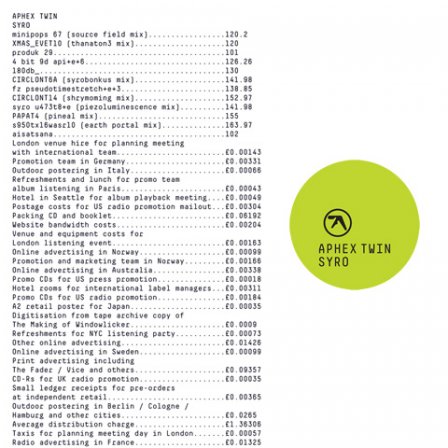It’s only when there’s an identifiable addition to Richard D. James’ ever-expanding discography that the features, interviews, and reviews start surfacing again. But more than just providing additional insight into the mind of such an elusive producer, they also remind us just how fucking busy this guy actually is, even when we’re not writing full-on features. He’s always trying his hand at something new, without moment for pause: producing under a multitude of pseudonyms, writing music commercially, building studios, DJing internationally, setting up orchestras, etc. It’s all part of what this fascinating, albeit sarcastic and reputably roguish character gets up to in between Aphex Twin records.
Drukqs came out over a decade before Syro’s tracklist surfaced on the deep web and before sightings of Aphex Twin blimps were hurriedly documented on Twitter. While that says nothing about James’ prolificacy or his motivation to create music, it does emphasize his complicated relationship with the Aphex moniker and the music he’s willing to attribute to it. James hinted at the primary reason for the project’s hiatus in his Pitchfork cover feature: “…it’s more interesting for me to stick things out anonymously. You get more of an honest reaction to what you’ve done. There’s no expectation in what people say.” One can only make a guess as to how much James has released into the public domain since Drukqs.
It’s that public supposition along with an understandable slice of excitement that has allowed the hype to mount so drastically since Warp announced the release of Syro last month. The album has been met with great acclaim, and after having spent a good few weeks living inside its anamorphic shell, it’s not hard to see why. James’ phenomenal fan base is a testament to the range of material he has released over the years, not to mention the weight of his moniker. Sure, “Aphex Twin” is essentially a brand, but that’s what makes this such a big deal: for all the compositional patience of Blue Calx and technical grit of The Tuss, Aphex Twin was unto its own as a defining characteristic of bench-marking 1990s electronic music.
How imposing, then, was another Aphex Twin album going to be in the current climate of consumption, where listeners bounce from one recording to the next with proportionately less investment than they might have in the past? Pretty fucking imposing, actually, even when the music sounds like it could only have come from James’ bottomless vault of unreleased music. The abrupt padding out and stripping down of drum beats; the acute derangement of sampled vocals; the disorienting journey through bass-heavy techno toward minimalist piano — the whole ordeal reeks of earlier material, which is a slippery mullet to the chops of anyone expecting to hear a major departure from the work that helped shape the Aphex brand to its current form. But his catalog is so ridiculously varied that such adherence should be expected — each of these tracks formulate some kind of miniature prism reflecting everything that’s lovable about this puzzling, unhinged and brilliant designer of sound.
One of Syro’s most striking accomplishments is the variety of patterns that bridge the album’s tracks and create a sense of cohesion. Within a single piece, James offers a torrent of his favored arrangements, and he does so in a way that’s fitting to the proverbial birthplace of his music. What’s interesting is how he also bridges links between the fast tempo of early 90s jungle and a memorable melody that’s always slightly off kilter, to the extent that you suddenly find yourself retracing access points, thought processes, and associations to try and figure out where the appeal lies. These experiences are built intricately into Syro’s blueprint — the music isn’t challenging when taken at face value, yet each track comes dripping with the unfathomable.
At 152 bpm and with a bare-bones intro of pitch-fucked keys, “CIRCLONT14 (Shrymoming Mix)” makes for the album’s most potent high. Even though it’s one of the fastest and most immediate tracks on Syro, the music falls away when the vocals hit — all twisted and whispering and unknowable — only to be built up again and taken in a different melodic direction while maintaining a fractured bass line. The course it runs is impossible to follow, but not because it’s difficult — at least not in the typical sense. In fact, these tunes are easy on the ears, their challenging nature worlds away from bludgeoning distortion, high-frequency shifts, and mechanical assault. “PAPAT4 (Pineal Mix)” embodies this nuance through the percussion that oscillates wildly across the track, with James skewing the drum patterns of early jungle persuasion while maintaining their raw, gritty edge, dementing them so that they fall to the knees of accompanying funky, ambient, and atonal keys. The result is knotty yet gracious, but because it’s reminiscent of earlier work, it could be confused as “more of the same” from the man who supposedly birthed his very own musical style.
In a case such as this, where the album has already been referred to as a comeback in the vein of Random Access Memories, m b v, or Tomorrow’s Harvest, it proves the point that each of these resurgents need to be judged on their own merit as opposed to being cast as yet another attempt at relighting a fire that has long since burnt out. Instead, Syro remains faithful to the very sounds and idiosyncrasies that brought Aphex Twin about, the way it transforms and rotates any feeling of assumption while managing to sound so deliciously typical. As a brand, Aphex Twin held that power over its listeners because the tracks it comprised were as predictive in their diversity as they were in their quality; they were shrouded behind a cloak of the unknown and guided at the helm by a mischievous prankster. James is still at the reigns, and Syro is proof that he is still very much the king of his own tangled domain.

